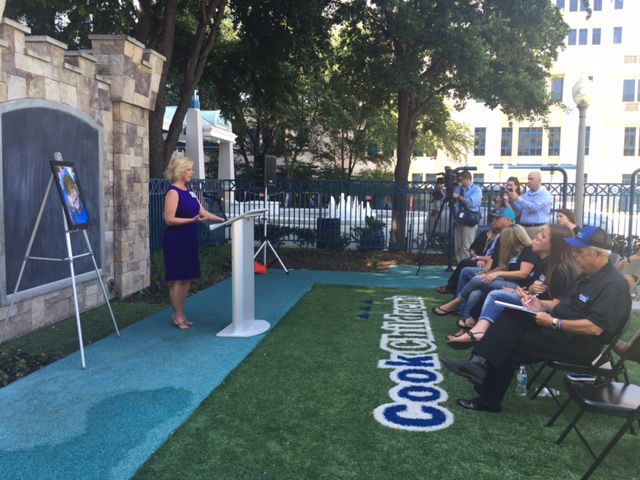A new drug to fight a rare but almost-always fatal, brain-eating amoeba is now available at Cook Children’s Medical Center, thanks to the parents of Kyle Gracin Lewis, who was 7 years old when he died of primary amebic meningoencephalitis in August, 2010.
The little boy was infected by the Naegleria fowleri amoeba while playing in the warm water of the Paluxy River, southwest of Fort Worth, near Glen Rose.
But, the microscopic ameba is commonly found in most lakes, rivers, streams, ponds and stock tanks anytime the water temperature is above 80 degrees, and especially if the water is very still and placid, said Dr. Warren Marks, pediatric neurologist at Cook Children’s, who has treated half a dozen children with the infection.
“The amoeba is there all the time, but not in its active form until the water temperature goes up in the late spring and summer in warm states like Texas and Oklahoma,” Marks said. “This is the prime season for primary amebic meningoencephalitis (PAM).”
The amoeba infects its victims and attacks their brains when contaminated water enters the body through the nose. Typically those infected have been swimming, diving or water skiing in fresh, untreated stagnant water, Marks said.
Symptoms are similar to bacterial meningitis and include severe frontal headache, fever, nausea and vomiting that progresses to stiff neck, seizures, altered mental status, hallucinations and coma.
Until recently there was no treatment for PAM other than life-support ventilators, and patients almost always died in a matter of days, usually before PAM was even be diagnosed, Marks said.
Only three people out of 138 known infected individuals in the U.S. between 1962 and 2015 have survived, according to the Centers for Disease Control and Prevention (CDC).
Cook Children’s announced Wednesday that the Fort Worth hospital has become the first hospital in the country to stock Miltefosine, the drug that has shown success in treating PAM and has only been available since March 2014, directly from the CDC, on a case by case basis.
The critical addition to Cook Children’s pharmacy may have never happened without the tireless work of Kyle’s parents, Jeremy and Julie Lewis of Midlothian, who have become tireless advocates for Amoeba awareness, said Roseanne Thurman, director of pharmacy at Cook Children’s.
“In 2014 the CDC reported the case of a 12-year-old survivor in Arkansas who had been treated for PAM with Miltefosine (which still does not have FDA approval for sale),” Thurman said. “Kyle’s dad was working with the CDC, and he brought the drug to my attention.
“I was not even aware it was available, but I have several grandchildren under 6, and they are all water babies. I was very interested.” Thurman said. “I talked with our doctors, and they said, yes, we definitely want that on hand.”
The first shipment of the expensive life-saving drug – 28 capsules for $16,000 – arrived last week, and Cook Children’s was designated the first regional distribution center. Kyle’s parents are working to help set up five such centers across the country to avoid any delays whenever it is needed anywhere in the country. If it gets out of date (in late 2017) before it is needed, the manufacturer will replace it at no additional charge.
“It’s that delay (in getting it from the CDC) that causes the most harm,” Thurman said.
Cook Children’s will share the drug with any hospital that needs it, not only pediatric centers, Thurman said. Anyone of any age can get PAM, although it most often strikes young boys, probably because they are more likely to jump and splash in the water.
Patients will usually be hospitalized while they are taking the drug for three to four weeks because life-support will be needed much of that time, by most patients who are infected, Marks said.
“Having Miltefosine housed at Cook Children’s is great progress that we are very thankful for, but we still believe awareness and swift action are so important in actually saving a life,” said Julie Lewis, Kyle’s mother, “Miltefosine is not the magic bullet, but it is one very important piece to a very complex puzzle.”
Kyle’s parents set up the Kyle Lewis Amoeba Awareness Foundation to help educate families about the danger of water-borne parasites and how to prevent infection, including wearing nose plugs or face masks in fresh, untreated water during hot summer months and posting warning signs at lakes, rivers and other recreational water areas.






